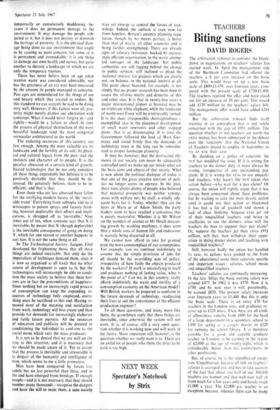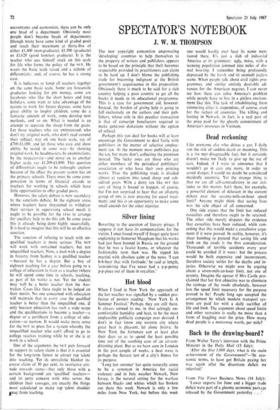Biting sanctions
TEACHERS DAVID ROGERS
The arbitration tribunal to consider the break- down in negotiations on teachers' salaries has started work. In April the management side of the Burnham Committee had offered the teachers a 6 per cent increase on the basic scale. This would have set up a new basic scale of £800-£1,470. over fourteen years. com- pared with the present scale of 030-£1,400. The teachers rejected the offer and have stood out for an increase of 30 per cent. This would add £120 million to the teachers' salary bill. The management offer would have added £244 million.
But the arbitration tribunal finds itself meeting in an atmosphere that is not solely concerned with the gap of £95+ million. The question whether or not teachers are worth the extra money has been submerged in the debate over the 'sanctions' that the National Union of Teachers intend to employ in September to try to win their case.
By deciding on a policy of sanctions the NUT has muddled the issue. If it is wrong for teachers to do dinner duty it must always be wrong, irrespective of any outstanding pay claim. If it is wrong for LEAS to use unquali- fied teachers, why hasn't the NUT taken this action before—why wait for a pay claim? Of course, the union will rightly argue that it has always been concerned about these problems; but by waiting to take the most drastic action until it could use that action as blackmail it has lost a lot of goodwill and shown a lack of clear thinking. Suppose LEAS get rid of their unqualified teachers, and bring in ancillaries to run the dinners, what will the teachers do then to support their pay claim? Or, suppose the teachers get their extra £954 million, will they then withdraw their oppo- sition to doing dinner duties and teaching with unqualified teachers?
Still, however badly the union has handled its case, its actions have pushed to the front of the educational scene three separate, specific and important issues: salaries, school meals and unqualified teachers.
Teachers' salaries are continually increasing. In the late 'fifties the basic starting salary was around £475. In 1962 it was £570. Now it is £730, and by next year it will, presumably. be around £820. The present salary increases over fourteen years to £1,400. But this is only the basic scale. There is an extra £70 for teachers in the London area, and graduates re- ceive up to £220 more. Then there are all kinds of allowances, ranging from £600 for the head of a large department in a secondary school to £300 for acting as a career, master or £120 for running the school library. It is therefore possible for a good and capable graduate teacher in London !o be earning in the region of £2,000 at the age of twenty-eight, which is considerably better thin his counterparts in other professions.
But, of course, he is the unpublicised excep- tion. Unpublicised, because all talk on teachers' salaries is averaged out, and has to take account of the fact that about one half of our 300,000 teachers are women and that well over half of them teach for a few years only and barely reach £1,000 a year. The £2,000 p.a. teacher is an exception because, whereas there can be many accountants and economists, there can be only one head of a department. Obviously most people don't become heads of departments (though many have some kind of graded post) and reach their maximum at thirty-five of either £1,400 (non-graduate), £1,500 (graduate) or £1,620 (good honours graduate). It is the teacher who sees himself stuck on this scale for life who forms the policy of the NUT. He wants the basic scale raised and a rethink of differentials: and, of course, he has a strong case.
It is ludicrous to lump all teachers together on the same basic scale. Some are housewife graduates looking for pin money, some are layabouts who like the short hours and long holidays, some want to take advantage of the system to work for future degrees, some have great ability to inspire children, some do a fantastic amount of work, some develop new methods, and so on. What is needed is an attempt to separate the sheep from the goats. Let those teachers who are uninterested, who don't try original work, who don't read around their subject, stay on one basic scale, say of £70041,100; and let those who care and show ability be tested in some way—by showing original work, by headmasters, by examinations, by the inspectorate—and move on to another higher scale, say £1,20041,800. This question of differentials ought to be rethought anyhow because of the effect the present system has on the primary schools. There must be some com- pensation in terms of financial awards to teachers for working in schools which have little opportunities to offer graded posts.
However, the salary debate is now secondary to the sanctions debate. In the eighteen areas where teachers have threatened to withdraw their services in supervising school meals it ought to be possible for the LEAs to arrange for ancillary help to do this job. In some areas this is already being done highly successfully. It is hard to imagine that this will be an effective sanction.
The sanction of refusing to teach with un- qualified teachers is more serious. The NUT will work with untrained teachers, but not unqualified teachers. Now, a man with a degree in forestry from Sydney is a qualified teacher —because he has a degree. But a boy of eighteen teaching for a year before going to a college of education to train as a teacher (where he will spend some time in schools, teaching, as part of his work) is not. Yet the student may well be a better teacher than the Aus- tralian. Cases like these ought to be judged on their merits. No one concerned with education will maintain that in every case the qualified teacher is better than the unqualified one, if only because education has such a wide scope and the qualifications to become a teacher—a degree or a certificate from a college of edu- cation—so narrow. It would make more sense for the NUT to press for a system whereby the unqualified teacher who can't afford to go to college receives training while he or she is at work in a school.
One of the arguments the NUT puts forward to support its salary claim is that it is essential for the long-term future to attract top talent into teaching. Yet its unrealistic blanket in- crease claim of 30 per cent, its restrictive atti- tude towards status—that only those with a certain background are 'qualified' teachers— and its petty concern with who serves the children their sausages, are exactly the things most calculated to make top talent shudder sway from teaching.































 Previous page
Previous page